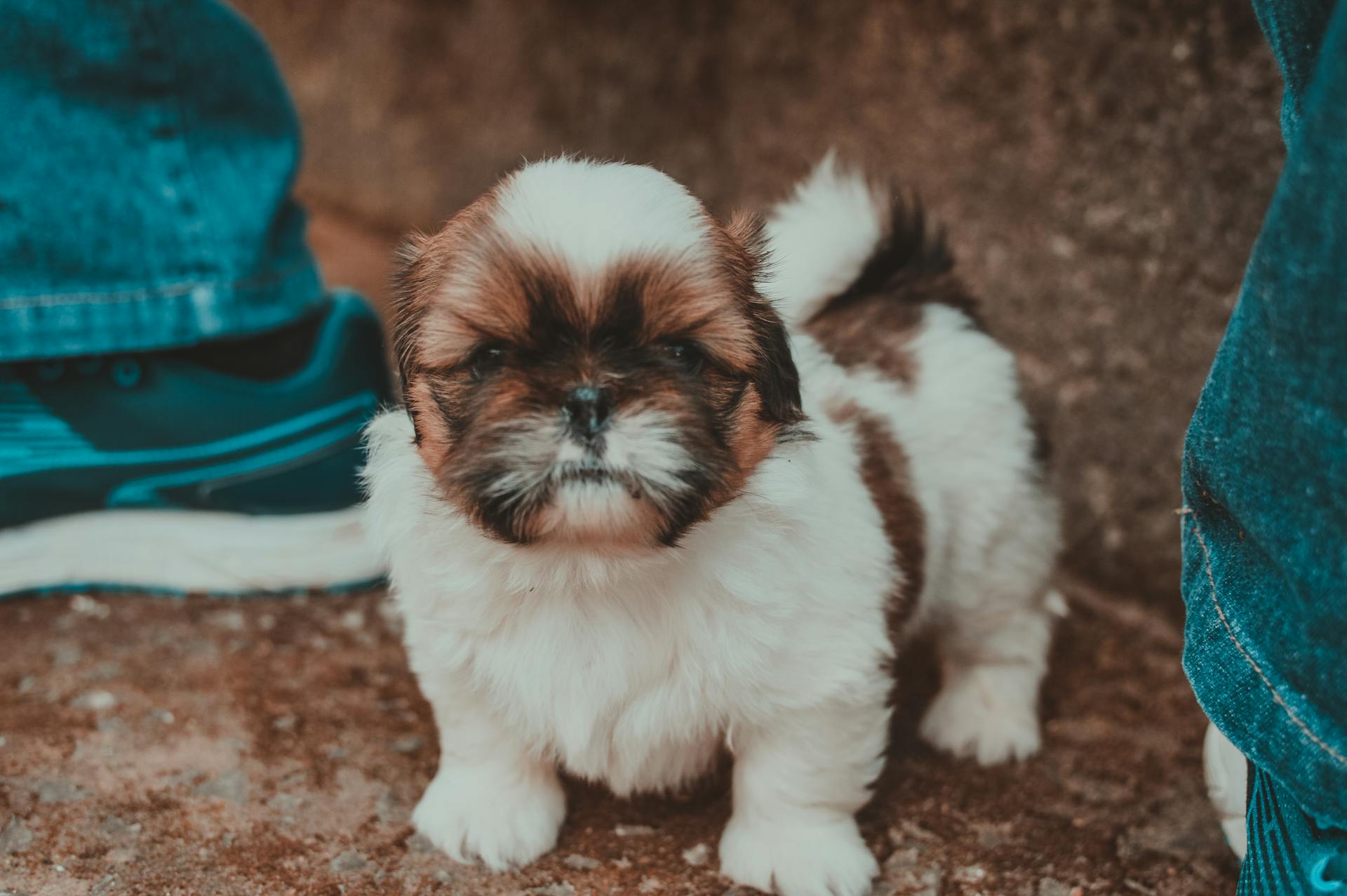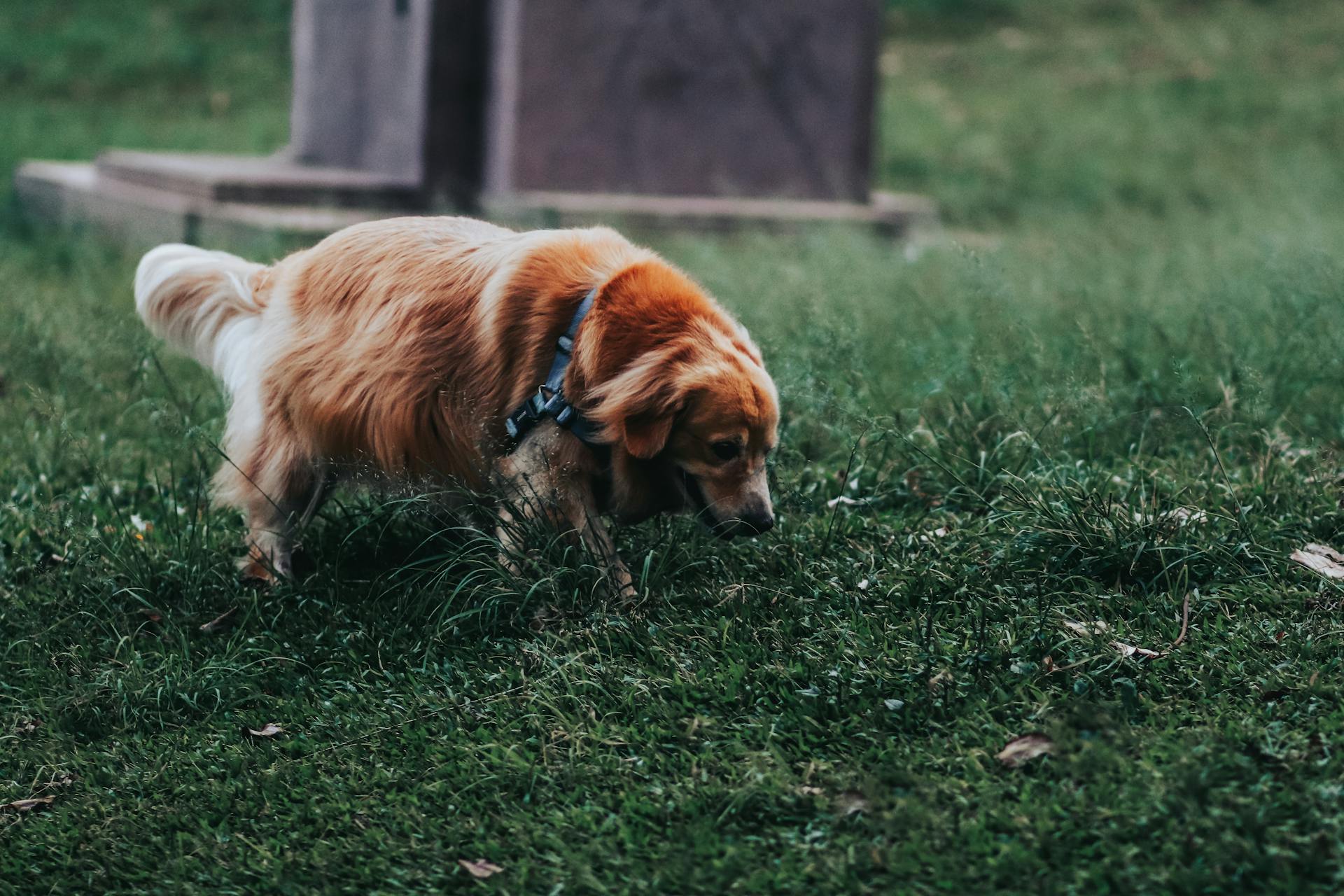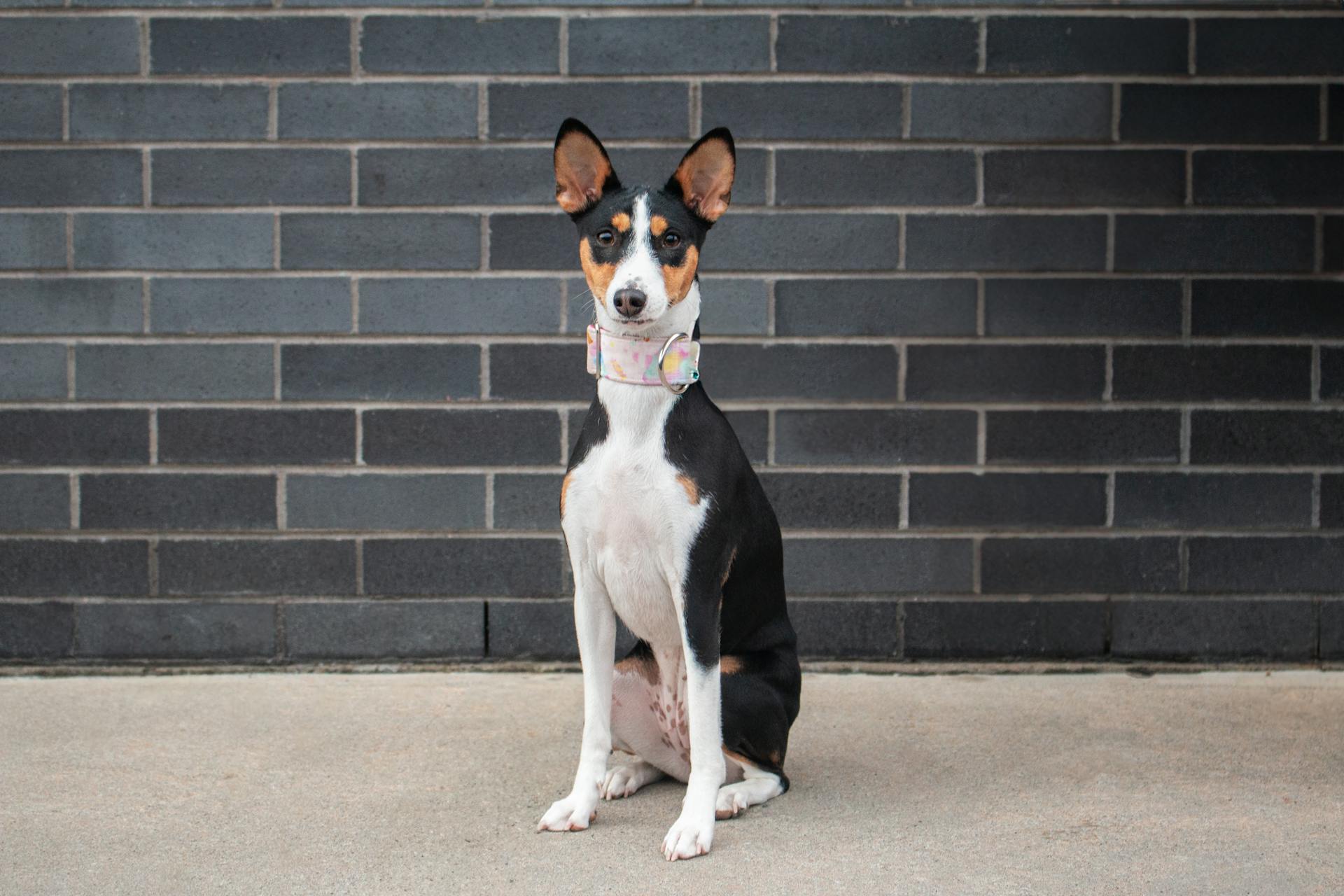
Shih Tzus can be prone to barking, especially if they're left alone for long periods of time. This is because they're social animals that thrive on interaction with their human family.
To address excessive barking, consider providing your Shih Tzu with plenty of attention and exercise throughout the day. This can help reduce the likelihood of barking due to boredom or separation anxiety.
House soiling is another common issue in Shih Tzus, often caused by medical conditions or lack of proper training. Regular veterinary check-ups and consistent potty training can help prevent this problem.
Shih Tzus can also be stubborn at times, making training a challenge. Consistency and positive reinforcement are key to overcoming this stubbornness and teaching your Shih Tzu good behavior.
Suggestion: Training a Shih Tzu
Behavioral Issues
Shih Tzus are known for their alert nature and will bark to alert their owners to new people or things in their environment. This is a natural behavior that's been passed down from their origins as alert dogs.
Excessive barking can be a sign of stress or anxiety in Shih Tzus. The leading causes of nuisance barking include lack of proper socialization, fear, and anxiety.
Shih Tzus are people-oriented dogs that require a lot of attention. If they don't receive the attention they're used to, they'll seek it out from their owners.
To prevent excessive barking, it's essential to provide mental stimulation and exercise for your Shih Tzu. Introducing your pet to its object of fear can also help.
Here are some common causes of snapping or nipping in Shih Tzus:
- Lack of early training
- Lack of socialization
- Poor nutrition
- Boredom
- Stress/anxiety
Growling and howling can be signs of aggression or fear in Shih Tzus. Other possible issues include stress, hunger, anxiety, pain, poor socialization, and illness.
To address howling in your Shih Tzu, it's crucial to eliminate sources of fear and provide proper socialization. Don't abuse your pup, and offer additional mental stimulation.
Here are some effective ways of addressing the howling problem:
- Proper socialization early enough.
- Eliminating sources of fear.
- Don’t abuse your pup.
- Offer additional mental stimulation.
- Visit a vet for medical check-ups.
- Maintain a daily routine.
Training and Socialization
Training and socialization are crucial for preventing most breed-specific behaviors in Shih Tzus. Excessive barking, stubbornness, separation anxiety, food guarding, and challenges in housebreaking are just a few of the potential issues you might face.
Shih Tzus can develop these behaviors due to lack of early training, lack of socialization, poor nutrition, boredom, and stress/anxiety caused by inadequate housing conditions. Socialization is key, especially during the puppy stage, as it helps them become confident and calm in new situations.
Some common challenges you may encounter while training a Shih Tzu include:
Socialization Are Crucial
Socialization is key to preventing many breed-specific behaviors in Shih Tzus. Socialization is crucial, especially in the first few months of a puppy's life.
A lack of socialization can lead to behaviors like snapping or nipping, which can be caused by a lack of early training, poor nutrition, boredom, or stress/anxiety caused by inadequate housing conditions.
Shih Tzus need to be socialized to a variety of people, dogs, and environments to help them become confident and calm in new situations.
Here are some specific socialization tips:
- Bring your puppy around a variety of people and dogs in different places.
- Get your puppy used to different sights, sounds, and experiences.
- Introduce your puppy to new environments, such as parks, stores, and friends' homes.
Socialization should start early and continue throughout a Shih Tzu's life. By socializing your puppy, you can help prevent many behavioral issues and create a well-adjusted and confident adult dog.
Shih Tzus are naturally wary of strangers and may take time to warm up to new people, so it's essential to socialize them carefully and patiently.
Puppy Mouthing
Puppy mouthing is a natural instinct in young dogs. A seven-month-old puppy turning your hand into a chew toy may seem cute, but it's a sign of teething and a phase that will pass.
Shih Tzus use their mouths to explore their surroundings, and it's a simple natural instinct before their first set of teeth erupts. This play turns rigorous once the teeth emerge, and your pup will know that mouthing inflicts pain.
Being a social animal, your dog isn't hard-wired to hurt you. In fact, being socialized is essential to reduce fear and anxiety in Shih Tzus.
- Proper socialization exposes your dog to new people, pets, and environments.
- Socialization helps your Shih Tzu become more comfortable and confident.
As your Shih Tzu grows, you can expect the mouthing to subside, but if you're concerned about biting and nipping issues after puppyhood, it's best to consult with a professional dog trainer.
Separation Anxiety
Separation anxiety is a common problem for many Shih Tzus, and it's especially prevalent in this breed due to their selective breeding as human companions.
Shih Tzus are prone to destructive behavior when left alone, such as chewing and excessive barking.
Some common signs of separation anxiety in Shih Tzus include destructive chewing, excessive vocalization, shedding, growling, and pawing.
Destructive chewing can be a major issue, and it's essential to address it promptly to prevent further damage to your home.
Excessive vocalization, including barking and whining, is another common sign of separation anxiety in Shih Tzus.
Shedding, growling, and pawing are also common behaviors exhibited by Shih Tzus experiencing separation anxiety.
Inappropriate defecation and urination can also occur when Shih Tzus are left alone and experience separation anxiety.
To manage separation anxiety, time-out techniques can be helpful in teaching your Shih Tzu to cope without you at home.
A crate training program can also be beneficial in reducing separation anxiety in Shih Tzus.
Consider reading: Do Shih Tzus Bark
If you're experiencing separation anxiety with your Shih Tzu, consider getting a second pet or hiring a dog sitter to provide companionship when you're away.
Entertaining your Shih Tzu with multiple fun toys can also help reduce separation anxiety.
Here are some common signs of separation anxiety in Shih Tzus:
- Destructive chewing
- Excessive vocalization, shedding, growling, and pawing
- Inappropriate defecation and urination
- Constantly following you
- Unnecessary nipping, freezing, or biting
These signs can be caused by a variety of factors, including fear, pain, alerting you of strangers, excitement or playfulness, dark environments, loud noises, anxiety, discomfort, thunder and lightning, seeking attention, movements at night, and boredom.
Housebreaking Your Pet
Housebreaking a dog refers to the process of training a dog to eliminate waste outside or in a designated indoor area, rather than inside the house.
This is typically one of the first and most important steps in training a new puppy or adopting an older dog.
To establish a routine, create a consistent schedule for feeding and taking your dog outside to go potty. This will help your dog learn when it’s time to go and reduce the likelihood of accidents inside the house.
You might enjoy: What Is a Shih Tzu
Supervising closely is crucial when you’re inside, keep a close eye on your dog to prevent accidents. Consider using a crate or confining your dog to a small area where you can easily monitor them.
Puppies have small bladders and will need to go outside frequently to avoid accidents. Take your puppy out at least every hour or two during the day, and increase the time gradually as they get older.
If your dog has an accident inside the house, clean it up thoroughly to remove any odor. Dogs have a strong sense of smell and may be more likely to go in the same spot if they can still smell their waste.
Here are some key housebreaking tips to keep in mind:
- Establish a routine: Create a consistent schedule for feeding and taking your dog outside to go potty.
- Use positive reinforcement: Reward your dog with treats, praise, and affection when they go potty in the right spot.
- Supervise closely: Keep a close eye on your dog to prevent accidents.
- Take your dog outside frequently: Puppies need to go outside often to avoid accidents.
- Be patient: Housebreaking can take time, and there may be accidents along the way.
- Clean up accidents thoroughly: Remove any odor to prevent your dog from going in the same spot again.
Grooming and Sensitivity
Shih Tzus are a sensitive breed, and they can be pretty irritable when it comes to grooming in general. They don't like being forced into situations where they feel trapped or threatened.
To approach grooming with your Shih Tzu, it's essential to use a gentle hand. If your Shih Tzu starts acting up during grooming sessions, try these tips:
- Stick to a gentle approach.
- Keep your pet busy.
- Create a stress-free environment.
- Use brain stimulation.
- Provide more attention and physical contact.
- Buy a second pet.
Sensitivity to Grooming
Shih Tzus are a sensitive breed, and they can be pretty irritable when it comes to grooming in general.
They don't like being forced into situations where they feel trapped or threatened.
If your Shih Tzu starts acting up during grooming sessions, try approaching everything with a gentle hand.
It's essential to avoid forcing them into situations that might make them feel uncomfortable or scared.
If your Shih Tzu starts acting up, it's a good idea to try the tips mentioned earlier, such as being gentle and patient.
Suggestion: Trim a Shih Tzu
Weeping
Weeping in dogs can be a sign of stress or anxiety, and it's essential to address the issue to prevent long-term problems. Stick to a daily routine with your pet to provide a sense of stability and normalcy.
Creating a stress-free environment is crucial in reducing weeping in dogs. This can be achieved by keeping your home calm and quiet, and avoiding loud noises or sudden movements.
A unique perspective: Shih Tzu Dogs Hypoallergenic
To keep your pet busy, engage them in activities that stimulate their mind and body, such as exercise, playtime, or puzzle toys. Brain stimulation is an excellent way to keep your pet's mind active and prevent boredom.
Providing more attention and physical contact can also help reduce weeping in dogs. Spend quality time with your pet, and show them love and affection to help them feel secure and relaxed.
A second pet can be a great companion for a weeping dog, but it's essential to introduce them slowly and under controlled circumstances to prevent any negative reactions.
Aggression and Fear
Aggression in Shih Tzus can be caused by a lack of early socialization, poor nutrition, boredom, stress/anxiety, or even playfulness. Identifying the root cause is crucial to addressing the behavior effectively.
Early socialization is essential to reduce fear and anxiety in Shih Tzus. Proper socialization exposes your dog to new people, pets, and environments to help them become more comfortable and confident.
Spaying or neutering your dog can also reduce hormone-driven aggressiveness. This simple procedure can make a significant difference in your Shih Tzu's behavior.
Common Causes of Aggression and Fear:
- Lack of early training
- Lack of socialization
- Poor nutrition
- Boredom
- Stress/anxiety
Barking for Protection
Shih Tzus can be protective of their owners and property, especially if they've formed strong bonds with people and become overly dependent on them for affection and attention.
This protective behavior can manifest as barking, which is a natural instinct for the breed.
Shih Tzus might bark at people and dogs passing by the window or off in the distance, or even at the front door when visitors arrive.
They're essentially saying "please pet me" through their barking.
To address this barking, it's essential to catch your dog in the act and communicate to them that what they're doing is wrong.
By doing so, you can help your Shih Tzu understand that barking isn't the best way to get attention.
Shih Tzus can become over-stimulated, leading to excessive barking, especially in situations like traveling in a car.
Adding a crate to your vehicle and popping your dog in it while traveling can help reduce barking.
With patience, consistency, and the right training, you can teach your Shih Tzu to stop barking inappropriately and unwarranted.
On a similar theme: Small Shih Tzu
An Aggressive Dog
Aggression in dogs is a serious issue that can be caused by a variety of factors, including fear, dominance, and even playfulness. Shih Tzus, in particular, are prone to aggression due to their small size and the fact that many owners allow or encourage it.
Aggressive behavior in Shih Tzus can manifest in different ways, such as snarling, growling, lunging, showing teeth, or biting. If left unchecked, it can lead to serious problems.
Some common causes of aggression in Shih Tzus include a lack of early training, socialization, poor nutrition, boredom, and stress/anxiety. Identifying the root cause of the aggression is crucial in addressing the behavior.
Here are some common signs of aggression in Shih Tzus:
- Snarling
- Growling
- Lunging
- Showing teeth
- Biting
To address aggression in Shih Tzus, it's essential to determine the cause and develop a plan to address it. This may involve socialization, training, and providing plenty of exercise and mental stimulation to prevent boredom and pent-up energy.
Consulting with a professional dog trainer can be beneficial if your Shih Tzu is still displaying aggressive behavior after puppyhood.
Growling and Howling
Growling and howling are common issues in Shih Tzus that can be caused by a range of factors, including stress, hunger, anxiety, pain, poor socialization, and illness.
Excessive barking, which is a natural behavior in Shih Tzus, can also be a sign of stress or anxiety in your dog. Identifying the underlying cause of your dog's growling and howling is crucial to addressing the issue.
A howl may seem amusing or charming, but it can irritate your neighbors. Small dog breeds growl due to aggression or fear, and your Shih Tzu might be facing both.
Some possible issues with your howling dog include stress, hunger, anxiety, pain, poor socialization, and illness. These issues can be addressed through proper socialization early enough, eliminating sources of fear, and offering additional mental stimulation.
Here are some possible reasons why your Shih Tzu might be growling and howling:
- Stress
- Hunger
- Anxiety
- Pain
- Poor socialization
- Illness
To address these issues, consider the following strategies:
- Proper socialization early enough.
- Eliminating sources of fear.
- Don’t abuse your pup.
- Offer additional mental stimulation.
- Visit a vet for medical check-ups.
- Maintain a daily routine.
Personality and Temperament
Shih Tzus are naturally affectionate and playful, but they can be a bit stubborn at times. They crave human company and are happiest when they're by your side.
This breed tends to be wary of strangers and prefer getting to know people on their own terms, which means they need plenty of socialization as puppies. They can be quick to make their feelings known if they're not properly socialized.
If you're thinking of introducing a Shih Tzu to small children, keep an eye on playtime - they don't tolerate rough play and will let you know if they're uncomfortable.
Here are some key personality traits to consider:
- Shih Tzus relish human company and are happiest when they're at your feet or side.
- They can be wary of strangers and prefer getting to know people on their own terms.
- They're usually comfortable with other dogs and pets, as long as introductions are careful.
Temperament & Personality
Shih Tzus are bred to be companions, which means they're designed to be by your side. They're affectionate, playful, and extroverted, but can be a little stubborn at times.
Their love for human company is unmatched - they'll follow you around the house and snuggle up next to you on the couch. They're happiest when they're at your feet or side, making them best suited for owners who can be home most of the time.
Shih Tzus can be wary of strangers, so it's essential to socialize them as puppies to help them feel more confident around new people. This breed tends to be wary of strangers and prefer getting to know people on their own terms.
They're usually comfortable with other dogs and pets, as long as introductions are careful. However, they don't tolerate rough play, especially with small children, so it's crucial to keep an eye on playtime.
Here are some key traits to keep in mind when considering a Shih Tzu as a pet:
Other Breed Traits
This breed is known for being loyal, trustworthy, and affectionate, making them a great addition to many families. They're confident and outgoing, which can be a great asset in social situations.
One thing to note is that they love to be pampered and can make great lap dogs. They're also relatively low maintenance when it comes to grooming, with little to no shedding.
However, their high energy levels mean they need regular exercise and mental stimulation to prevent boredom. They're not typically aggressive unless provoked, but may want to guard their toys and possessions.
Here are some key characteristics to keep in mind:
- Highly intelligent and adapts to training if you are persistent
- Good energy levels
- Level of barking is high with this breed
- No shedding, but coat needs regular grooming and clipping
Overall, their loving and adaptable nature makes them a great fit for many households.
The Right for You
Shih Tzus are known for their strong desire to protect what they consider their own, which can sometimes lead to guarding issues. This is a common trait in many breeds.
To address this, it's essential to establish clear rules and boundaries with your Shih Tzu. Consistency and routine are key to successful training.
Dogs, including Shih Tzus, are hard-wired to want to belong to a social group with a strong leader. This is what makes them feel secure and less anxious.
Bark Busters training method employs no force or pain, only communication that dogs understand. It's a language they learned at birth, and they respond quickly to it.
To get the best out of your Shih Tzu, you need a trainer who understands the breed's personality and needs.
Frequently Asked Questions
How to calm down a Shih Tzu?
Establish a daily routine for your Shih Tzu, including regular meal times, walks, and play sessions, to help calm them down and reduce stress. A predictable schedule can provide a sense of security and stability for your furry friend.
Featured Images: pexels.com


